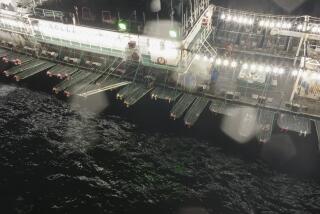Rough Sailing : Money Problems Hamper Russian’s Global Voyage
A middle-aged Russian journalist set out last year with the dream of sailing the world under the same conditions and hardships as explorers 200 years ago.
He got his wish.
Michael Poboronchuk, 43, is leading an expedition of three small wooden boats that set sail from Vladivostok, Russia, last June and docked in Ventura Harbor this week.
He and his 11-member crew, including five Americans and one cat who have joined the voyage along the way, will push off again Sunday and head toward Los Angeles Harbor, possibly stopping at Oxnard along the way.
At all their stops, which have included ports from Alaska to Santa Barbara, the voyagers open their ships to the public, give tours to schoolchildren and present slide shows of their trip.
Eventually, the voyage will continue south, around the tip of Latin America, then north to Greenland and east toward Europe and home.
Poboronchuk conceived of the voyage about 10 years ago when he visited the Bering Strait, envisioning it as both a tribute to the explorer Vitus Bering, the Danish navigator who sailed the tiny strait, and as an international goodwill mission.
He helped build the 52-foot-long pine boats, adorned with bright multicolored sails and delicately carved wood trim, that are replicas of Bering’s ships.
But the similarities between this expedition and the voyages of Old World explorers go deeper than the size or appearance of the ships.
Like their forebears, Poboronchuk and his crew of nine men and two women are not quite sure how far they will get or how they will get there.
“All the time, problems, problems, problems,” said the burly Poboronchuk as he furrowed his sunburned brow during an interview on board the St. Peter. “I’m so tired from this.”
And the problems all boil down to money.
Without the sponsorship of any governments and with appeals for backing from American corporations going unheeded, the expedition has so far been scraping by with individual donations and proceeds from souvenir sales.
At each dock, the crew spreads a display of various Russian-lettered T-shirts that sell for about $12 to $15, decorative pins priced at $5, postcards and various other gift items.
Poboronchuk said he hopes that the money from the souvenir sales eventually will add up to the several thousand dollars needed to buy a new engine for the St. Peter.
Looking ahead, the sailor is worried about where he will get the thousands of dollars he will need for the crew’s visa fees in the Latin American countries in which they hope to dock.
In addition to donations and souvenir sales, the voyagers also depend on the kindness of strangers, particularly dockmasters.
The Ventura Harbor Village, for example, allowed the ships to dock free for three days and at a discounted rate for the other two days of their stay here, said Dockmaster Brett Helton. Normally, the daily berthing fee for the ships would be $60, he said.
“We’re just trying to make it a little easier on them,” he said.
Harbor Village officials are also sponsoring a dinner for the crew Saturday night and have invited Ventura city officials and port district commissioners.
Helton said he might have been able to help the expedition get business sponsors here if he had been contacted in advance.
“I kind of get the impression they’re playing it by ear,” he said. “They’re basically sailors and don’t know how to market themselves.”
Although Poboronchuk may not be a marketing wizard, word about the voyage is getting around.
Helton said Thursday that he had received three calls from people who wanted to join the expedition, including one from a Russian living in the Bay Area.
Indeed, the crew is continually replenished by such new blood.
Most of the 17 Russians who began the trip from Vladivostok had to drop out after a few months to return to their lives.
But Americans--three men and two women so far--keep hopping on board, including one man who joined the expedition last week in Santa Barbara.
Poboronchuk said he would like to find a mechanic who speaks Russian and Spanish to join the voyage. But, he said, “it’s difficult.” Current crew members speak English or Russian.
The money shortage is exacerbated because the voyage is taking much longer than expected. Poboronchuk had expected that by this time, he would have sailed around Latin America and be on the East Coast of the United States.
Asked when he expected to finally arrive back home, the sailor raised his index finger and rolled his eyes: “Ask Him,” he said.
He is also upset about the ethnic rivalries that have broken out throughout the former Soviet Union since his crew set out.
“We leave the U.S.S.R.,” he said. “We’ll be back in Russia. We lost our country. It’s broken.”
Later, the interview was interrupted when an older visitor, surveying the expedition’s souvenir display, called out to Poboronchuk, “Do you have any photos of Gorbachev?”
“Fortunately, no,” the sailor said grumpily.
More to Read
Sign up for The Wild
We’ll help you find the best places to hike, bike and run, as well as the perfect silent spots for meditation and yoga.
You may occasionally receive promotional content from the Los Angeles Times.






